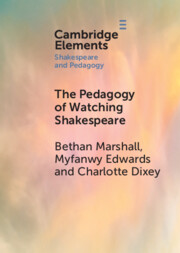Element contents
The Pedagogy of Watching Shakespeare
Published online by Cambridge University Press: 18 April 2024
Summary
- Type
- Element
- Information
- Online ISBN: 9781009118743Publisher: Cambridge University PressPrint publication: 16 May 2024
References
References
- 4
- Cited by

